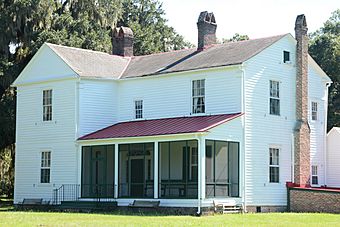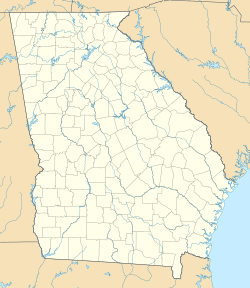Hofwyl-Broadfield Plantation facts for kids
Quick facts for kids |
|
|
Hofwyl-Broadfield Plantation
|
|

Back of the main house
|
|
| Nearest city | Darien, Georgia |
|---|---|
| Area | 1,500 acres (610 ha) |
| NRHP reference No. | 76000635 |
| Added to NRHP | July 12, 1976 |
The Hofwyl-Broadfield Plantation was a large farm located by the Altamaha River in Glynn County, Georgia. For many years, from 1800 to 1915, it was a major producer of rice. After 1915, growing rice was no longer profitable, so the plantation changed. It became a dairy farm until 1942, raising cows for milk. Today, it is a special historic site where you can learn about its past.
Contents
The Plantation's Story
Early Days and Growth
The land that became Hofwyl-Broadfield Plantation had a long history. It was first called Broadface. In 1806, William Brailford bought the land and renamed it Broadfield. After he passed away, the property went to his son-in-law, Dr. James M. Troup. Dr. Troup was the brother of Governor George Troup.
By 1849, when Dr. Troup died, the plantation had grown very large. It covered 7,300 acres. Many people were forced to work there as slaves. The plantation then went to Dr. Troup's daughter, Ophilia Troup, and her husband, George Dent. The main house you see today was built around the early 1850s. Around that time, they added "Hofwyl" to the name.
Challenges and Changes
When the American Civil War began, George Dent and his 15-year-old son, James, joined the Confederate Army. Ophilia and her children moved to a safe camp near Waycross, Georgia. After the war ended, the family had lost much of their wealth. Large parts of the land had to be sold to pay taxes.
By 1880, when James Dent took over the property, the family was still facing financial difficulties. When James Dent died in 1913, the family was still in debt. His son, also named James, and his daughters, Miriam and Ophilia Dent, decided to change the plantation. They started operating it as a dairy farm.
From Dairy to Historic Site
The dairy farm was active until 1942. At its busiest, it had about 35 cows. They produced 100 to 150 bottles of milk every day. When the dairy farm closed in 1942, the family was finally out of debt.
The two sisters, Miriam and Ophilia Dent, were the fifth generation of their family to live in the house. Ophilia was the last survivor, and she lived there until 1973. She decided to leave the property to the state of Georgia.
Since then, the natural marshland has grown back over the old rice fields. In 1976, the Hofwyl-Broadfield Plantation was added to the National Register of Historic Places. Today, it is run as a Georgia State Historic Site. The Georgia Department of Natural Resources manages 1,268 acres of land and 696 acres of marsh. It's a great place to learn about Georgia's history.
Images for kids
- Hofwyl-Broadfield Plantation - State Historic Site, pamphlet by the state of Georgia
 | George Robert Carruthers |
 | Patricia Bath |
 | Jan Ernst Matzeliger |
 | Alexander Miles |







